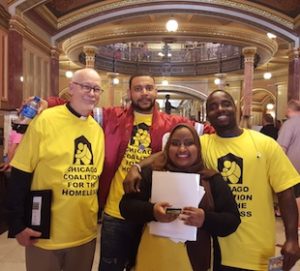Because many returning citizens face homelessness during their reentry to the community, our Reentry Project addresses barriers, with a focus on access to housing and jobs.

The Reentry Project partners in the Restoring Rights and Opportunities Coalition of Illinois (RROCI), working with Cabrini Green Legal Aid Clinic and Community Renewal Society. RROCI advocates for state policies that remove barriers for people in reentry, including lifetime employment bans and limited access to housing. Heartland Alliance was part of RROCI from 2016 – 2020.
RROCI has passed nine pieces of reentry legislation since 2016:
Four job-access bills in schools, park districts and health care were enacted in 2016.
Two record-sealing bills were passed in 2017 and 2018.
In 2019, RROCI enacted housing reentry protection to the Illinois Human Rights Act.
Housing-access and jobs-access bills were passed into law in 2021.
In a 2010 study, Barred from Housing, the Reentry Project asked the Chicago Housing Authority to end automatic rejection of applicants who were on probation less than five years. Instead, CHA was asked to inform applicants that there is an appeal process available, and allow those who are denied to present a case that they have changed their lives. By 2013, the CHA adopted this appeals process, and the Reentry Project began to advocate the housing pilots. In 2016, Cook County’s housing authority adopted a similar process for use during the initial application phase.
The Reentry Project designed a housing pilot enacted by the Chicago and Cook County housing authorities. The pilots allow select reentry service providers to certify 50 high-performing clients for access to subsidized housing. Instead of imposing a five-year wait, the housing authorities allow certified returning citizens to access a housing unit or rejoin family that lives in subsidized housing. Both pilots were fully implemented by December 2017.
The Reentry Project is managed by a steering committee of formerly incarcerated women and men, service providers, educators, and advocates.
For more information, contact Niya Kelly, Director of State Legislative Advocacy, Equity and Transformation.
